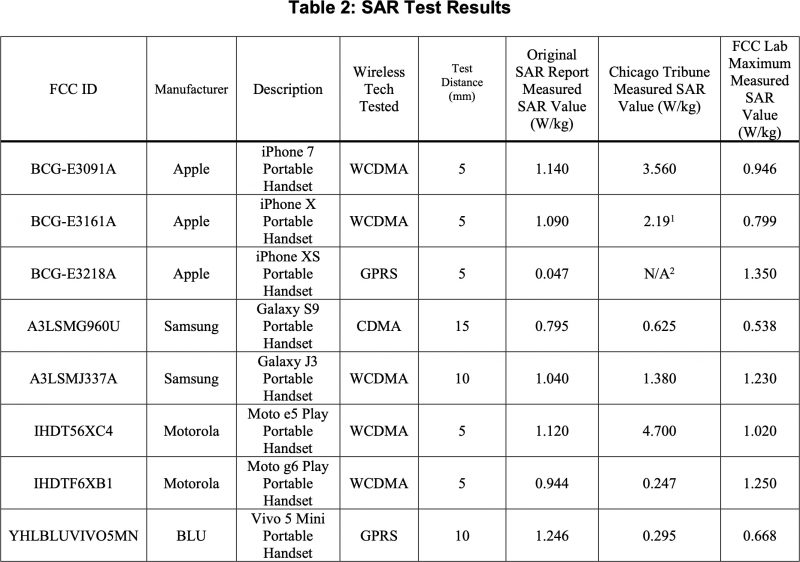
iPhones from Apple and smartphones from Samsung did not violate FCC rules on maximum radiofrequency exposure levels, the FCC said today (via Bloomberg).
Back in August, an investigation launched by The Chicago Tribune suggested that some of Apple's iPhones were emitting radiofrequency radiation that exceeded federal safety limits.

The FCC's testing results for iPhone and other smartphones
The newspaper hired an accredited lab to test several smartphones, including Apple's iPhones, according to federal guidelines and found that some of Apple's iPhones violated federal guidelines.
Apple at the time disputed the results and said that the testing was inaccurate "due to the test setup not being in accordance with procedures necessary to properly assess the iPhone models."
In response to the investigation, the FCC promised to do its own testing of smartphones from Apple and Samsung, and the FCC's testing disagrees with the findings from The Chicago Tribune."All iPhone models, including iPhone 7, are fully certified by the FCC and in every other country where iPhone is sold," the statement said. "After careful review and subsequent validation of all iPhone models tested in the (Tribune) report, we confirmed we are in compliance and meet all applicable ... exposure guidelines and limits."
The FCC tested the iPhone 7, the iPhone X, and the iPhone XS using models that were purchased from the open market and those provided by Apple. No FCC test showed the results that The Chicago Tribune got from its independent testing.
Full results from the testing can be seen in the document released today by the FCC. [PDF]All sample cell phones tested by the FCC Laboratory, both grantee-provided and FCC- purchased samples, produced maximum 1-g average SAR values less than the 1.6 W/kg limit specified in the FCC rules. Therefore, all tested sample devices comply with the FCC RF radiation exposure general population/uncontrolled limits for peak spatial-average SAR of 1.6 W/kg, averaged over any 1 gram of tissue as specified in 47 CFR Sn. 2.1093(d)(2), and these tests did not produce evidence of violations of any FCC rules regarding maximum RF exposure levels.
After The Chicago Tribune's report went live, law firm Fegan Scott launched its own investigation and last week said that its laboratory also found that iPhones exceeded the federal safety limits for radiofrequency radiation.
Fegan Scott filed a lawsuit against Apple, claiming to use "actual use conditions" in its test, rather than "conditions set by manufacturers." The FCC modeled its testing after the testing done by The Chicago Tribune, evaluating the iPhone by using a fluid-filled head and body replica and testing RF absorption at the highest possible smartphone power levels.
The law firm did not provide details on its testing methods and it is not clear if the case will progress now that the FCC's research and testing has worked out in Apple's favor.
Article Link: FCC Says iPhone Didn't Exceed Radiofrequency Radiation Safety Levels
Last edited by a moderator:



